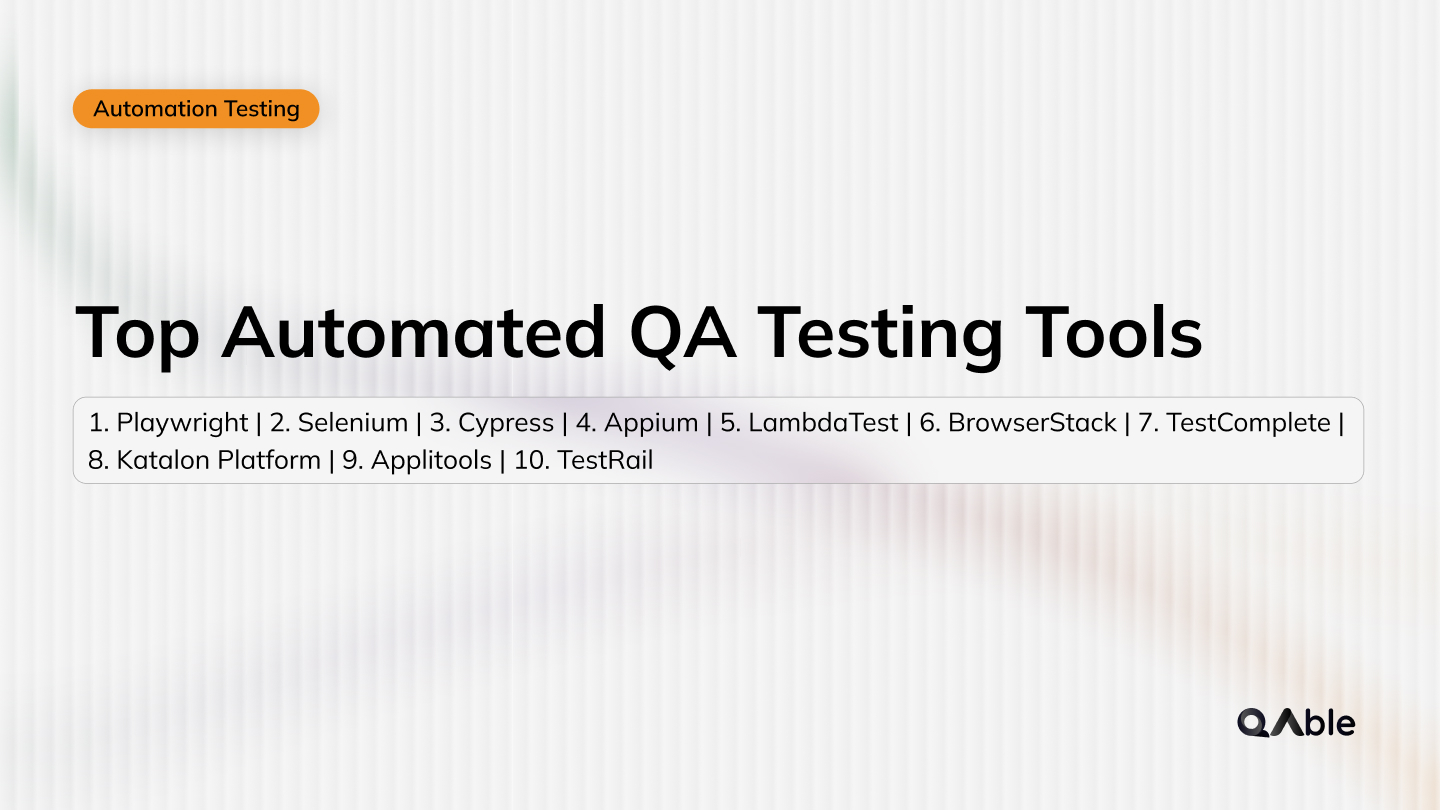Table of content
SHARE THIS ARTICLE
Is this blog hitting the mark?
Contact Us
Table of Content
- Understanding Salesforce Testing
- Creating Effective Test Cases
- Salesforce Testing Tools
- Overcoming Challenges in Salesforce Testing
- Best Practices for Salesforce Testing
- Conclusion
- FAQs
Are you Navigating the complex world of Salesforce testing or seeking to enhance your understanding of automation and tools in the Salesforce environment? Welcome to our comprehensive guide, where we'll explore essential aspects like test cases, tools, and best practices for a robust and error-free CRM system.
In the dynamic realm of customer relationship management (CRM), Salesforce stands tall as a versatile and robust platform. Ensuring seamless functioning is vital for business operations and critical for a positive user experience. This guide aims to provide a deep dive into testing methodologies, effective test cases, and the role of automation tools. Let's embark on this journey to enhance your understanding of Salesforce testing.
Understanding Salesforce Testing
Salesforce Testing Overview:
Salesforce testing is a meticulous process that involves verifying and validating various components of the platform. The goal is to ensure that Salesforce operates seamlessly, meeting business requirements while maintaining data accuracy and security. Let's explore the fundamental types of testing in the Salesforce environment.
Types of Testing in Salesforce:
Unit Testing:
Unit testing involves isolating individual components of the Salesforce application and validating their functionality. This ensures that each module performs as intended, preventing potential issues down the line.
Integration Testing:
Salesforce often integrates with other systems and applications. Integration testing focuses on verifying that these integrations work harmoniously, ensuring data consistency and smooth communication between different modules.
Salesforce Automation Testing:
Automation testing is a game-changer in the world of Salesforce. By leveraging automation tools, repetitive and time-consuming testing tasks can be automated, improving efficiency and reducing the risk of human errors.
Security Testing:
Given the sensitive nature of customer data within Salesforce, security testing is paramount. This involves assessing vulnerabilities, access controls, and data encryption to safeguard against potential breaches.
Performance Testing:
Performance testing evaluates how Salesforce performs under various conditions, such as high user loads or data-intensive processes. It ensures that the platform can handle real-world scenarios without compromising speed or stability.
Read more: Issues of CRM System Identified by CRM Testing
Creating Effective Test Cases
Why Test Cases Matter:
The foundation of any successful testing strategy lies in the creation of effective test cases. These detailed scenarios serve as a roadmap for validating different aspects of the Salesforce environment. Let's delve into the significance of test cases and explore examples tailored to Salesforce testing.
Data Entry Validations:
One of the fundamental aspects of Salesforce testing is ensuring accurate data entry. Test cases in this category would encompass scenarios such as:
- Validating mandatory fields to ensure they cannot be left blank.
- Checking data formats, such as date and email validations.
- Verifying that data input aligns with predefined criteria, preventing errors in data processing.
Workflow Automation:
Salesforce's strength lies in its ability to automate complex business processes. Effective test cases for workflow automation would involve:
- Validating the triggering of automated workflows based on specified criteria.
- Verifying the accuracy of automated field updates and email notifications.
- Ensuring that approval processes function as intended, with proper routing and notifications.
User Interface Testing:
The user interface (UI) is the gateway to Salesforce for end-users. Test cases for UI testing focus on:
- Verifying the layout and appearance of different Salesforce pages.
- Ensuring the responsiveness of the UI across various devices and screen sizes.
- Validating that buttons, links, and navigation elements function correctly.
Salesforce Testing Tools
Exploring Salesforce Testing Tools:
Selecting the right testing tools is crucial for a seamless testing process. Salesforce provides its own testing tools, and there are also external tools widely used in the industry. Let's explore some prominent ones.
Selenium for Automation:
Selenium is a popular open-source automation testing tool. It supports multiple programming languages and is well-suited for testing web applications, making it an excellent choice for Salesforce automation testing.
JUnit for Java-Based Testing:
If your Salesforce implementation involves custom Apex code, JUnit can be a valuable tool for Java-based testing. It allows developers to write unit tests for their Apex classes and triggers.
Salesforce Apex Test Framework:
Salesforce itself provides the Apex Test Framework for testing Apex code. This framework allows developers to write and execute unit tests to ensure the reliability and functionality of their custom code.
Apache JMeter for Performance Testing:
When it comes to evaluating the performance of your Salesforce instance, Apache JMeter is a powerful tool. It helps simulate various user loads and assesses how well your Salesforce environment handles the stress.
TestRail for Test Case Management:
Efficient test case management is crucial for organizing and tracking testing efforts. TestRail is a test management tool that allows teams to organize test cases, plan test runs, and track results.
Also read: Top 6 Automation Testing Frameworks
Overcoming Challenges in Salesforce Testing
Common Challenges and Solutions:
As with any sophisticated platform, Salesforce testing comes with its own set of challenges. Let's explore some common issues and practical solutions to address them.
Data Management Challenges:
- Challenge: Managing test data in Salesforce can be complex, especially when dealing with large datasets.
- Solution: Consider using data loading tools like Salesforce Data Loader or work with sandbox environments to create realistic test scenarios.
Continuous Updates and Change Management:
- Challenge: Salesforce regularly releases updates, and managing changes can be challenging.
- Solution: Establish a robust change management process, including sandbox testing for new releases and updates.
Ensuring Comprehensive Test Coverage:
- Challenge: It can be challenging to ensure that all aspects of your Salesforce instance are thoroughly tested.
- Solution: Develop a comprehensive testing strategy that includes a mix of manual and automated testing, covering both functional and non-functional aspects.
Balancing Test Automation and Manual Testing:
- Challenge: Finding the right balance between automated and manual testing can be tricky.
- Solution: Prioritize automation for repetitive and time-consuming tasks, while reserving manual testing for scenarios that require human intuition and exploration.
Best Practices for Salesforce Testing
Tips for Successful Salesforce Testing:
Regression Testing Strategies:
Regularly perform regression testing to ensure that new changes or updates don't adversely impact existing functionalities.
User Interface Testing Tips:
Pay special attention to UI testing, as a positive user experience is crucial for user adoption and satisfaction.
Collaboration between Development and Testing Teams:
Foster a collaborative environment between development and testing teams to ensure effective communication and shared understanding of testing requirements.
Documentation and Knowledge Sharing:
Document test cases, strategies, and results comprehensively. Knowledge sharing within the team ensures continuity and a shared understanding of the testing process.
Performance Testing at Scale:
Conduct performance testing at scale to simulate real-world scenarios. This helps identify potential performance bottlenecks and ensures that Salesforce performs optimally under various conditions.
Conclusion
In conclusion, mastering Salesforce testing is a continuous journey that requires a blend of technical expertise, strategic planning, and a commitment to excellence. By incorporating effective test cases, leveraging the right testing tools, and following best practices, you can build a robust testing framework for your Salesforce environment.
QAble, a top software testing company in India, has provided you with this comprehensive guide to Salesforce testing. We understand the critical role that thorough testing plays in the development lifecycle. If you, as a software company or startup, find yourself at any stage of development and encounter challenges in Salesforce testing or any other aspect of software quality, consider your trusted partner.
Why Choose QAble:
- Expertise: Our team comprises seasoned professionals with extensive experience in software testing across various domains.
- Comprehensive Services: We provide a wide range of software testing services, ensuring that your applications meet the highest quality standards.
- Tailored Solutions: We understand that every project is unique. Our testing strategies are customized to align with your specific requirements and goals.
- Collaborative Approach: We believe in fostering strong partnerships. By collaborating closely with your development teams, we ensure seamless communication and shared goals.
Whether you are grappling with Salesforce testing, performance testing, security testing, or any other aspect of software quality assurance, our dedicated team is ready to assist you.
Let QAble be your go-to partner in ensuring the reliability, security, and performance of your software applications.
Discover More About QA Services
sales@qable.ioDelve deeper into the world of quality assurance (QA) services tailored to your industry needs. Have questions? We're here to listen and provide expert insights


Nishil Patel is the Co-founder of QAble, delivering advanced test automation solutions with a focus on quality and speed. He specializes in modern frameworks like Playwright, Selenium, and Appium, helping teams accelerate testing and ensure flawless application performance.
.svg)














.webp)
.webp)
.png)
.png)











.png)



.png)

.png)

.png)






.jpg)













.webp)

